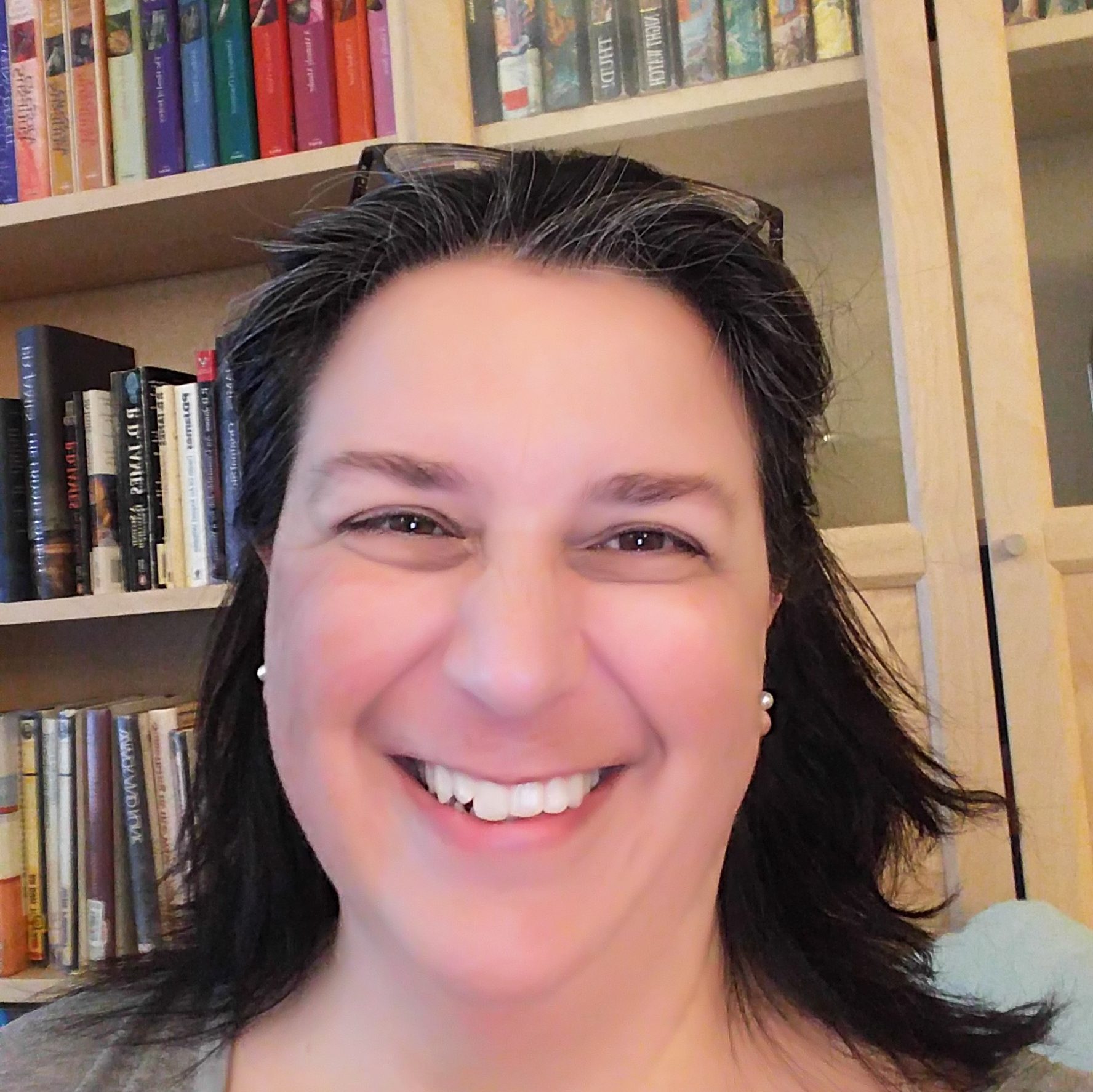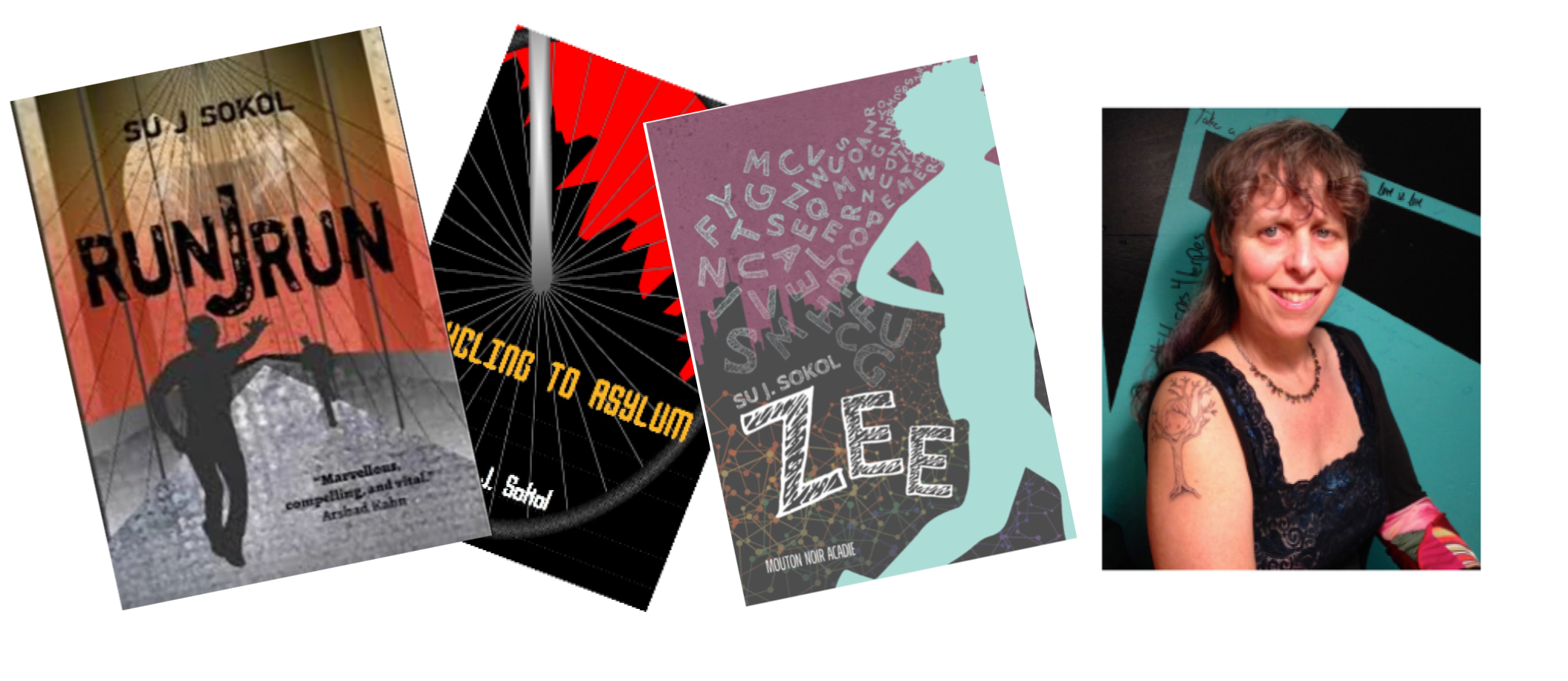Su J Sokol (www.sujsokol.com) (pronouns xe/xyr) is the author of three amazing novels, two “speculative fiction” – (more on that ‘definition’ later) and one contemporary urban. Xyr first book Cycling to Asylum was longlisted for the Sunburst Award and has been optioned for a feature length film. My path crossed with Su’s when xe requested a review for xyr second novel, Run J Run. What an amazing novel it was, and received a well deserved spot with the Ottawa Review of Books. I was not able to attend the launch of xyr third novel, but I wanted to give some kudos to this remarkable author so I invited xyr to be the first author that I put under the Author Spotlight!
Links to Su’s books are provided at the bottom of this article.
Q: Why did you start writing?
A: I think I have always written, even if the writing happened only in my head. Storytelling is, for me, a mediating tool through which I try to make sense of the world and communicate that sense to others. Writing has helped me to come to terms with complex emotions, to see more layers of meaning in events, to better understand my identities, and to analyze and try to speak truth about political and social issues. The latter has been an especially important element of my writing because of my belief that art is inherently political, and that speculative fiction, in particular, can be a powerful way to imagine and suggest positive social and political change.
Q: Do you belong to a writing or critique group?
A: Yes. I currently belong to two writing groups, and both have existed for around eight years. This is no small thing when you consider that we have met every two weeks during all that time, even during the pandemic, though these meetings have been through a video chat application. My writing groups are extremely important to me. I workshopped each of my novels and short stories in their entirety with both of my groups, and not only has this improved my work but I am a better writer because of the people in my groups. In addition, since writing is, by its nature, a more or less solitary occupation, writers’ groups can perform a crucial function as a source of community and moral support.
Q: Where did you get the idea for yours book? (Sorry, I know this is cliché but people like to know!)
I got the idea for my first novel, Cycling to Asylum, biking home from the community organization where I work with immigrants and refugees. I, myself, am an immigrant, having moved from the U.S. to Québec for political reasons. I was thinking about how sneaking across the border by bicycle would be a great way to flee repression in the United States. I decided it would make a good story. However, because I didn’t think most Canadians would believe that the U.S. was bad enough that a person could be entitled to political refugee status, I decided to set the story in the future and call it science fiction. I came up with this idea in 2008, started writing it in 2011, and it was published in 2014. Ironically, many people call it prescient as it seemed to anticipate certain political events that followed its publication.
My second novel, Run J Run, was an emotional outgrowth of Cycling to Asylum. In Cycling, there is the potential for a romantic relationship between one of my main characters, Laek, and his best friend, Philip—a relationship that is actually encouraged by Laek’s partner, Janie. I resisted delving into this too deeply in my first novel, but it felt as though my characters did not want to leave me alone about it. Finally, I decided to write a separate novel featuring a polyamorous relationship between three characters who are loosely based on Laek, Janie, and Philip. The book critiques the false boundaries we place between ourselves and others, and our society’s treatment of people living with mental illness.
The idea for my third novel, Zee, came from the fact that when my daughter was very young, I thought she could read minds. In fact, a real incident from her childhood went straight into the story. In addition, based on my own experience, I know how hard it can be when you attend too much to the thoughts and ideas of others and ignore your own. I took these two things and created a story about a kid who can read the minds and feel the emotions of others and how this not only makes it difficult to find her own path but somehow literally changes who she is. The story is an exploration of the limits—and power—of empathy, as well as of identity and non-traditional family.
Q: Labor or Labour? How important is spelling and grammar to you? Do you contemplate an international audience?
As an immigrant to Canada, originally from the United States, who lives in the French-speaking province of Québec, I have thought a lot about language and spelling. In Cycling to Asylum, the first half of the book takes place in New York and the second half takes place in Canada. I decided to use U.S. spelling for the first half and Canadian spelling for the second so that the reader could transition into Canada along with my characters. In addition, I wove French words, dialogue, and usage into the second half of the book.
In Run J Run and Zee, both of which take place in New York City, I use U.S. spelling, and in my novel-in-process, which will take place in Canada only, I use Canadian spelling. In all of my fiction, including my short stories, I tend to include at least a little French and Spanish, along with the English.
I am a perfectionist, so I am very careful with grammar, punctuation, and spelling. On the other hand, people don’t strictly follow grammar rules in their casual speech. Because I love capturing realistic dialogue, I include what are technically grammatical errors in dialogue and even inner dialogue rather than clean it up to the point where it doesn’t sound authentic.
Q: What are you working on now?
A: I am writing a sequel to my first novel. The tentative title is Five Points on an Invisible Line and it takes place approximately three years after Cycling to Asylum ends. I did not originally plan to write a sequel, and I was surprised when a lot of people asked me about it. I finally spoke to a fellow writer who’d also wondered if I would write a sequel, asking him why people inquired about a possible sequel since the book has an ending that does not leave any obvious unfinished business. He told me it’s because my characters feel hyper real and it seems as though I am not done with them. It turns out that he was right. I am not done with them and they are not done with me!
Su’s books are available at the following booksellers:
Cycling to Asylum (Deux Voiliers Publishing, 2014)
Run J Run (Renaissance Press 2019)
Zee (Mouton Noir Acadie 2020, available in both English and French)

